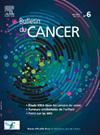Insuffisance rénale aiguë chez les patients traités par inhibiteur du check-point immunitaire-recommandations communes FITC/SFNDT
IF 1.1
4区 医学
Q4 ONCOLOGY
引用次数: 0
Abstract
Les traitements des cancers ont été bouleversés par l’arrivée et le développement des inhibiteurs du check-point (points de contrôle) immunologique (ICI). Ces traitements induisent de multiples effets secondaires dont des insuffisances rénales aiguës. L’association à d’autres traitements rend la réflexion diagnostique complexe. Pour aider les médecins prenant en charge ces patients, la Société française d’immunothérapie du cancer (FITC) et la Société française de néphrologie dialyse et transplantation (SFNDT) proposent des recommandations de prise en charge décrivant le bilan pré-thérapeutique, le diagnostic des différentes atteintes observées et la prise en charge des néphrites interstitielles aiguës secondaires aux ICI. L’essor de l’onconéphrologie, pour laquelle la collaboration entre prescripteurs d’ICI et néphrologues est cruciale, permet d’améliorer les connaissances et l’identification de parcours de prise en charge. Les éléments clés de la réflexion diagnostique sont présentés. La place de la biopsie rénale est revalorisée puisque paraissant peu utilisée par rapport aux bénéfices attendus. Sa réalisation permet de ne pas arrêter à tort l’ICI et d’utiliser les traitements immunosuppresseurs appropriés. Le traitement basé sur la corticothérapie est recommandé selon des schémas dépendant de la sévérité et de la réponse rénale à la corticothérapie. Les traitements alternatifs en cas de résistance à la corticothérapie sont évoqués mais il existe encore peu de données dans les atteintes rénales. La ré-exposition à l’ICI est en général encouragée au vu du faible risque de rechute.
Cancer treatments have been dramatically modified by the introduction and the development of immunological checkpoint inhibitors (ICI). These treatments have many side effects, including acute kidney injury (AKI). Their combination with other treatments makes the diagnosis complex. To provide guidance to physicians treating these patients, the FITC and the SFNDT have developed a set of management guidelines covering pre-treatment assessment, diagnosis of the different types of damage observed, and management of acute interstitial nephritis secondary to ICI. Collaboration between oncologists and nephrologists is mandatory. The development of onconephrology is helping to improve knowledge and identify treatment pathways. The key elements of the diagnostic process are presented. The role of renal biopsy is discussed, as it appears to be underused in relation to the expected benefits. Renal biopsy allows ICI to be continued if AKI is not related to AKI. Treatment based on glucocorticoid therapy is recommended, with regimens depending on the severity of the disease and the renal response to glucocorticoid therapy. Alternative treatments for patients resistant to corticosteroids are discussed, but strong data are lacking. Rechallenge should be discussed since it seems to be associated with a good renal prognosis.
[接受免疫检查点抑制剂治疗的癌症患者急性肾损伤- FITC/SFNDT共享指南]。
免疫检查点抑制剂(ICI)的引入和发展极大地改变了癌症治疗。这些治疗有许多副作用,包括急性肾损伤(AKI)。它们与其他治疗方法的结合使诊断变得复杂。为了给治疗这些患者的医生提供指导,FITC和SFNDT制定了一套管理指南,涵盖治疗前评估、观察到的不同类型损害的诊断以及继发于ICI的急性间质性肾炎的管理。肿瘤学家和肾病学家之间的合作是强制性的。肿瘤学的发展有助于提高知识和确定治疗途径。介绍了诊断过程的关键要素。肾活检的作用是讨论,因为它似乎没有充分利用相对于预期的好处。如果AKI与AKI无关,肾活检允许继续进行ICI。建议以糖皮质激素治疗为基础,治疗方案取决于疾病的严重程度和肾脏对糖皮质激素治疗的反应。讨论了对皮质类固醇耐药患者的替代治疗方法,但缺乏强有力的数据。再挑战应该讨论,因为它似乎与良好的肾脏预后有关。
本文章由计算机程序翻译,如有差异,请以英文原文为准。
求助全文
约1分钟内获得全文
求助全文
来源期刊

Bulletin Du Cancer
医学-肿瘤学
CiteScore
1.90
自引率
16.70%
发文量
224
审稿时长
37 days
期刊介绍:
Without doubt, the ''Bulletin du Cancer'' is the French language publication of reference in the field of cancerology. Official organ of the French Society of Cancer, this journal covers all the information available, whether in the form of original articles or review articles, but also clinical cases and letters to the editor, including various disciplines as onco-hematology, solids tumors, medical oncology, pharmacology, epidemiology, biology as well as fundamental research in cancerology. The journal proposes a clinical and therapeutic approach of high scientific standard and regular updates in knowledge are thus made possible. Articles can be submitted in French or English.
 求助内容:
求助内容: 应助结果提醒方式:
应助结果提醒方式:


